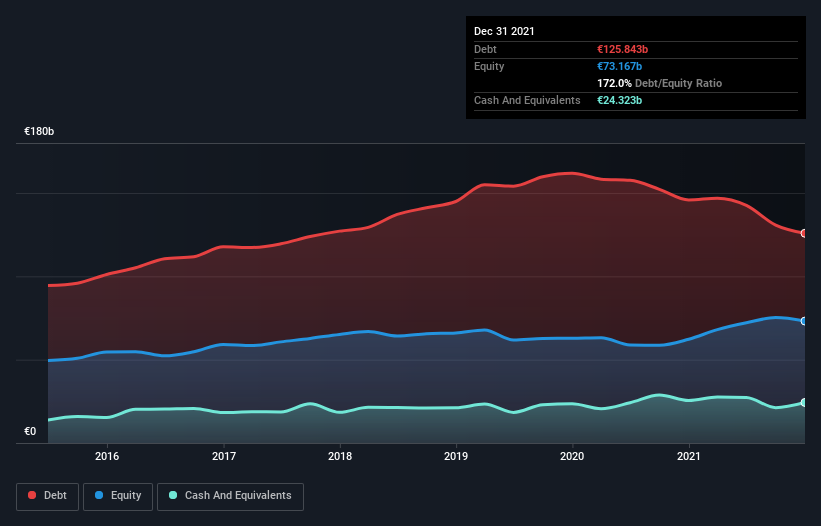These 4 Measures Indicate That Mercedes-Benz Group (ETR:MBG) Is Using Debt Reasonably Well

Howard Marks put it nicely when he said that, rather than worrying about share price volatility, 'The possibility of permanent loss is the risk I worry about... and every practical investor I know worries about.' It's only natural to consider a company's balance sheet when you examine how risky it is, since debt is often involved when a business collapses. As with many other companies Mercedes-Benz Group AG (ETR:MBG) makes use of debt. But should shareholders be worried about its use of debt?
When Is Debt Dangerous?
Debt is a tool to help businesses grow, but if a business is incapable of paying off its lenders, then it exists at their mercy. If things get really bad, the lenders can take control of the business. However, a more common (but still painful) scenario is that it has to raise new equity capital at a low price, thus permanently diluting shareholders. By replacing dilution, though, debt can be an extremely good tool for businesses that need capital to invest in growth at high rates of return. When we think about a company's use of debt, we first look at cash and debt together.
Check out our latest analysis for Mercedes-Benz Group
How Much Debt Does Mercedes-Benz Group Carry?
The image below, which you can click on for greater detail, shows that Mercedes-Benz Group had debt of €125.8b at the end of December 2021, a reduction from €145.8b over a year. On the flip side, it has €24.3b in cash leading to net debt of about €101.5b.

How Strong Is Mercedes-Benz Group's Balance Sheet?
The latest balance sheet data shows that Mercedes-Benz Group had liabilities of €87.7b due within a year, and liabilities of €99.0b falling due after that. Offsetting these obligations, it had cash of €24.3b as well as receivables valued at €9.94b due within 12 months. So it has liabilities totalling €152.4b more than its cash and near-term receivables, combined.
This deficit casts a shadow over the €67.7b company, like a colossus towering over mere mortals. So we definitely think shareholders need to watch this one closely. After all, Mercedes-Benz Group would likely require a major re-capitalisation if it had to pay its creditors today.
We measure a company's debt load relative to its earnings power by looking at its net debt divided by its earnings before interest, tax, depreciation, and amortization (EBITDA) and by calculating how easily its earnings before interest and tax (EBIT) cover its interest expense (interest cover). Thus we consider debt relative to earnings both with and without depreciation and amortization expenses.
As it happens Mercedes-Benz Group has a fairly concerning net debt to EBITDA ratio of 5.3 but very strong interest coverage of 94.5. This means that unless the company has access to very cheap debt, that interest expense will likely grow in the future. Pleasingly, Mercedes-Benz Group is growing its EBIT faster than former Australian PM Bob Hawke downs a yard glass, boasting a 147% gain in the last twelve months. The balance sheet is clearly the area to focus on when you are analysing debt. But ultimately the future profitability of the business will decide if Mercedes-Benz Group can strengthen its balance sheet over time. So if you want to see what the professionals think, you might find this free report on analyst profit forecasts to be interesting.
Finally, while the tax-man may adore accounting profits, lenders only accept cold hard cash. So it's worth checking how much of that EBIT is backed by free cash flow. Happily for any shareholders, Mercedes-Benz Group actually produced more free cash flow than EBIT over the last three years. There's nothing better than incoming cash when it comes to staying in your lenders' good graces.
Our View
We weren't impressed with Mercedes-Benz Group's net debt to EBITDA, and its level of total liabilities made us cautious. But its interest cover was significantly redeeming. When we consider all the factors mentioned above, we do feel a bit cautious about Mercedes-Benz Group's use of debt. While debt does have its upside in higher potential returns, we think shareholders should definitely consider how debt levels might make the stock more risky. There's no doubt that we learn most about debt from the balance sheet. However, not all investment risk resides within the balance sheet - far from it. To that end, you should learn about the 2 warning signs we've spotted with Mercedes-Benz Group (including 1 which is potentially serious) .
When all is said and done, sometimes its easier to focus on companies that don't even need debt. Readers can access a list of growth stocks with zero net debt 100% free, right now.
If you're looking to trade Mercedes-Benz Group, open an account with the lowest-cost platform trusted by professionals, Interactive Brokers.
With clients in over 200 countries and territories, and access to 160 markets, IBKR lets you trade stocks, options, futures, forex, bonds and funds from a single integrated account.
Enjoy no hidden fees, no account minimums, and FX conversion rates as low as 0.03%, far better than what most brokers offer.
Sponsored ContentNew: Manage All Your Stock Portfolios in One Place
We've created the ultimate portfolio companion for stock investors, and it's free.
• Connect an unlimited number of Portfolios and see your total in one currency
• Be alerted to new Warning Signs or Risks via email or mobile
• Track the Fair Value of your stocks
Have feedback on this article? Concerned about the content? Get in touch with us directly. Alternatively, email editorial-team (at) simplywallst.com.
This article by Simply Wall St is general in nature. We provide commentary based on historical data and analyst forecasts only using an unbiased methodology and our articles are not intended to be financial advice. It does not constitute a recommendation to buy or sell any stock, and does not take account of your objectives, or your financial situation. We aim to bring you long-term focused analysis driven by fundamental data. Note that our analysis may not factor in the latest price-sensitive company announcements or qualitative material. Simply Wall St has no position in any stocks mentioned.
About XTRA:MBG
Mercedes-Benz Group
Operates as an automotive company in Germany and internationally.
Established dividend payer and good value.
Similar Companies
Market Insights
Community Narratives



